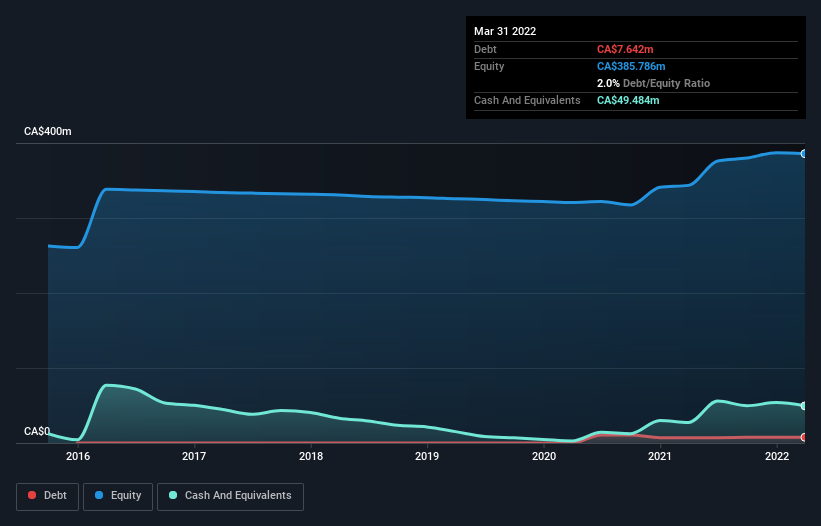Is Fission Uranium (TSE:FCU) A Risky Investment?
Warren Buffett famously said, 'Volatility is far from synonymous with risk.' So it seems the smart money knows that debt - which is usually involved in bankruptcies - is a very important factor, when you assess how risky a company is. We can see that Fission Uranium Corp. (TSE:FCU) does use debt in its business. But is this debt a concern to shareholders?
When Is Debt Dangerous?
Debt assists a business until the business has trouble paying it off, either with new capital or with free cash flow. In the worst case scenario, a company can go bankrupt if it cannot pay its creditors. However, a more frequent (but still costly) occurrence is where a company must issue shares at bargain-basement prices, permanently diluting shareholders, just to shore up its balance sheet. By replacing dilution, though, debt can be an extremely good tool for businesses that need capital to invest in growth at high rates of return. The first step when considering a company's debt levels is to consider its cash and debt together.
View our latest analysis for Fission Uranium
How Much Debt Does Fission Uranium Carry?
The image below, which you can click on for greater detail, shows that at March 2022 Fission Uranium had debt of CA$7.64m, up from CA$7.12m in one year. But it also has CA$49.5m in cash to offset that, meaning it has CA$41.8m net cash.
A Look At Fission Uranium's Liabilities
We can see from the most recent balance sheet that Fission Uranium had liabilities of CA$2.39m falling due within a year, and liabilities of CA$11.1m due beyond that. Offsetting this, it had CA$49.5m in cash and CA$235.7k in receivables that were due within 12 months. So it actually has CA$36.2m more liquid assets than total liabilities.
This short term liquidity is a sign that Fission Uranium could probably pay off its debt with ease, as its balance sheet is far from stretched. Simply put, the fact that Fission Uranium has more cash than debt is arguably a good indication that it can manage its debt safely. When analysing debt levels, the balance sheet is the obvious place to start. But it is future earnings, more than anything, that will determine Fission Uranium's ability to maintain a healthy balance sheet going forward. So if you want to see what the professionals think, you might find this free report on analyst profit forecasts to be interesting.
Since Fission Uranium doesn't have significant operating revenue, shareholders must hope it'll sell some fossil fuels, before it runs out of money.
So How Risky Is Fission Uranium?
We have no doubt that loss making companies are, in general, riskier than profitable ones. And in the last year Fission Uranium had an earnings before interest and tax (EBIT) loss, truth be told. And over the same period it saw negative free cash outflow of CA$24m and booked a CA$8.9m accounting loss. Given it only has net cash of CA$41.8m, the company may need to raise more capital if it doesn't reach break-even soon. Overall, its balance sheet doesn't seem overly risky, at the moment, but we're always cautious until we see the positive free cash flow. The balance sheet is clearly the area to focus on when you are analysing debt. However, not all investment risk resides within the balance sheet - far from it. For instance, we've identified 2 warning signs for Fission Uranium (1 is significant) you should be aware of.
If you're interested in investing in businesses that can grow profits without the burden of debt, then check out this free list of growing businesses that have net cash on the balance sheet.
Have feedback on this article? Concerned about the content? Get in touch with us directly. Alternatively, email editorial-team (at) simplywallst.com.
This article by Simply Wall St is general in nature. We provide commentary based on historical data and analyst forecasts only using an unbiased methodology and our articles are not intended to be financial advice. It does not constitute a recommendation to buy or sell any stock, and does not take account of your objectives, or your financial situation. We aim to bring you long-term focused analysis driven by fundamental data. Note that our analysis may not factor in the latest price-sensitive company announcements or qualitative material. Simply Wall St has no position in any stocks mentioned.
Join A Paid User Research Session
You’ll receive a US$30 Amazon Gift card for 1 hour of your time while helping us build better investing tools for the individual investors like yourself. Sign up here

 Yahoo Finance
Yahoo Finance 
